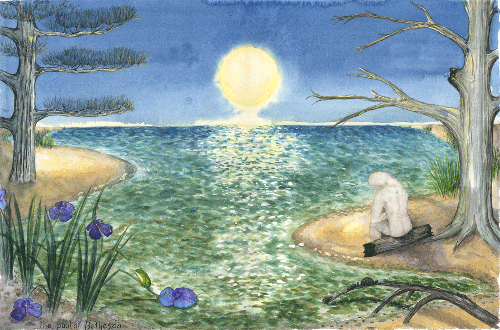The subject of "the pool at Bethesda" alludes to the following
excerpt from the Thorton Wilder play "The Angel that Troubled the Waters".
The play is based on the biblical verses of John 5:1-4, but it changes the
end of the parable. I first encountered this excerpt within the book "Abba's
Child: The Cry of the Heart for Intimate Belonging".
The play tells of a physician who comes periodically
to the pool of Bethesda, hoping to be the first in the water and healed of
his melancholy when the angel appears and troubles the water. Everybody at
the pool also hopes to be the first in the water and thereby healed of his
malady. The angel appears but blocks the physician at the moment he is ready
to step into the pool and be healed.
Angel: "Draw back, physician, this moment is not for you."
Physician: "Angelic visitor, I pray thee, listen to my prayer.
Angel: "Healing is not for you."
Physician: "Surely, surely, the angels are wise. Surely, O Prince, you
are not deceived by my apparent wholeness. Your eyes can see the nets in which
my wings are caught; the sin into which all my endeavors sink half-performed
cannot be concealed from you."
Angel: "I know."
..................
Physician: "Oh, in such an hour was I born, and doubly fearful to me
is the flaw in my heart. Must I drag my shame, Prince and Singer, all my days
more bowed than my neighbor?"
Angel: "Without your wound where would your power be? It is your very
remorse that makes your low voice tremble into the hearts of men. The very
angels themselves cannot persuade the wretched and blundering children on
earth as can one human being broken on the wheels of living. In Love’s
service only the wounded soldiers can serve. Draw back."
Later, the person who enters the pool first and was healed rejoices in his
good fortune then turns to the physician before leaving and said:
"But come with me first, an hour only, to my home. My son is lost in
dark thoughts. I -- I do not understand him, and only you have ever lifted
his mood. Only an hour . . . my daughter, since her child has died, sits in
the shadow. She will not listen to us but she will listen to you."
For me, this story has made all the difference and, because the message of
this excerpt—“Without your wound where would your power be?“—carries
so much meaning for me, I have long wanted to paint my own image of this story.
I decided to finally paint what this story meant to me when the new provost
at Bryn Mawr, Ralph Kuncl, asked me to do a painting for his office.

Everywhere in the painting the symbolism of the "brokenness" of a thing serving to support another is illustrated: the broken iris flower supports a frog, the broken branch supports the turtles, another broken tree branch supports the human. The human was painted androgenous with a decidedly dejected, sad, broken spirit. The light is from a moon actually...I had in mind a large, yellow harvest moon when it hangs low on the horizon. I didn't have a conscious reason for a moon rather than the sun but I did realize that the way I painted it would make it ambiguous. Some of you have suggsted the tacit knowlege that might have subconsciously driven the choice, intensity and importance of the sphere-light in the painting. I do love light! As well as water, which is why they both dominate the image.